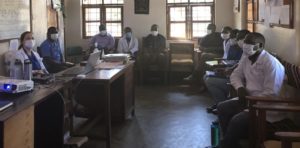Today is my last official day of work (but tomorrow I may join in somewhere in the hospital). It has been such a bittersweet day as I said goodbye to many new friends but also reflected on all that I have learned in the past four weeks. I returned to maternity today and, surprisingly, there was not much going on besides rounds. This was good, however, as it left time in the afternoon to meet with the nurses and midwives to discuss natural family planning. There were 15 people in attendance! In discussion with them, it seems that being able to offer an option for family planning that does not include devices, barriers, or hormones is of great value to them. Some patients have objections to using hormonal or device-based methods of contraception that include both religious reasons and personal beliefs. Also, many husbands do not allow their wives to use contraception, especially devices such as the arm implant or IUD. Furthermore, some patients have tried several methods of contraception already and have had side effects that have made them quit using those methods. Ugandan families are large with couples on average having 4-5 children. Large families are valued and having many children is a sign of being blessed. While couples typically desire many children, they usually also see the benefits of spacing their children so as to honor their responsibilities to their existing family (as well as for the health of the mother). For this reason, the midwives felt husbands would be motivated to use a natural method of family planning even if they objected to other forms of contraception. While my time with the midwives and nurses was not long enough to fully train them to teach an evidence-based natural family planning method, I believe we were able to introduce the topic and correlate the signs of fertility that are tracked in these methods with the physiology of a woman’s menstrual cycle. From here, I feel confident that these healthcare providers can seek further training and begin to notice signs of fertility that they can counsel patients to observe.
Lugandan word of the day: okuba olubuto (“oh-koo-buh oh-loo-boo-toe”, pregnancy)
Medical learning point of the day: When using IV primaquine to treat malaria (from Plasmodium vivax or ovale), infuse it with IV fluids containing dextrose as primaquine can cause severe hypoglycemia.

